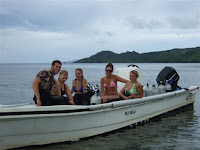Papua New Guinea, Fiji, and Indonesia : Asia-Pacific Coral Reef Program

Coral reefs of the Asia-Pacific region contain the most diverse concentrations of life on the planet. Indonesia and Papua New Guinea form two sides of the renowned diversity hotspot know as the “coral triangle,” while Fiji, diverse in its own right, is famous for its spectacularly colorful coral communities and array of endemic species. WCS operates a marine project in each of these countries, integrating ecological and socioeconomic research to provide novel approaches to conservation and management while meeting community needs.
The Human Aspect
The majority of coastal communities throughout Indonesia, PNG, and Fiji rely heavily upon marine resources for sustenance and income. With coastal populations rapidly expanding, and a move towards more modern, efficient and damaging fishing methods, many reefs in the Asia-Pacific region are facing threats of overexploitation and destruction. This in turn is affecting the livelihoods of the communities that are so heavily dependent upon the marine environment. Achieving marine conservation in the region requires finding a balance between conserving biological wealth and maintaining the livelihoods of the communities dependent upon the marine environments.
Threats
The most significant threats facing coral reefs in this region are overfishing, destructive fishing practices, and coral bleaching. The generally long life spans of targeted reef species, as well as the relatively low productivity of reef ecosystems, makes reef fishery stocks particularly susceptible to overfishing. Furthermore, a number of fishing methods commonly employed in the region, including dynamite and cyanide fishing and the use of monofilament nets, not only deplete fisheries stocks at an alarming rate, but also damage or destroy essential reef habitats. The bleaching of corals from elevated sea temperatures is also significantly changing reef habitats, and the long-term impacts of this phenomenon are still largely unknown.
WCS Activities
WCS uses an integrated natural and social science approach to identify which types of management are successful in maintaining or improving reef ecosystem condition and which socioeconomic factors are responsible for this success. So far, WCS has found that management systems that are most responsive to the needs and priorities of local communities achieve the best compliance with management regulations and subsequently achieve the greatest conservation success. WCS is now beginning to implement identified successful management strategies in receptive communities. In PNG and Fiji, existing systems of customary marine tenure (community ownership of reefs) will be used as an avenue to implement and enforce management strategies, while in Indonesia, alternative systems of management will be implemented and tested within the framework of national park zoning plans.
The long-term success of conservation strategies in the region will also rely heavily upon a strong local scientific staff to implement, monitor, and adapt management strategies. One of the major objectives of this program is to build the capacity of young local marine scientists to carry out research and monitoring within each country. WCS’ activities to achieve this objective include marine training courses, supervision of postgraduate projects, and one-on-one mentoring of interns working with the program. It is hoped that through these activities, WCS can build a strong local scientific contingent to continue conservation efforts in the Asia-Pacific region well into the future.
Important Next Steps
-
Continue to identify the most effective management strategies.
-
Develop optimal management strategies tailored to local social, cultural, and economic conditions.
-
Implement optimal management strategies in receptive communities as part of a locally managed marine area network.
-
Monitor, evaluate, and adapt management strategies to ensure their long-term effectiveness.
-
Train young scientists, conservation practitioners, and managers to be able to implement and adapt management strategies and to train others in marine research and monitoring techniques.







.JPG)

